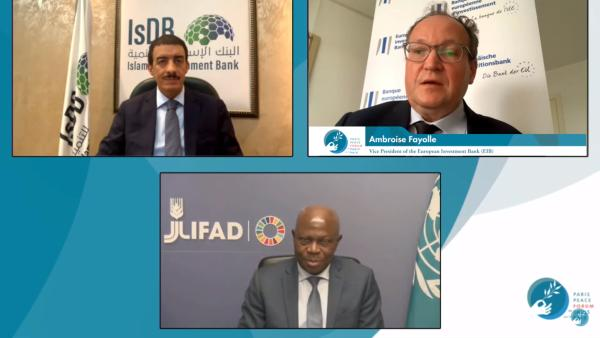
Taking place on the eve of the Summit on Financing African Economies hosted by President Macron, the Paris Peace Forum Spring Meeting focused on solutions to bridge the North-South divide on critical challenges, such as vaccines, debt and climate in these times of pandemic, with a special emphasis on Africa.
EIB Vice-President Ambroise Fayolle discussed concrete joint initiatives to shape a better recovery for Africa in a high-level panel, alongside Bandar M. H. Hajjar, President of the Islamic Development Bank (IsDB) Group and Gilbert Houngbo, President of the International Fund for Agricultural Development (IFAD).
Asked about the EIB priorities for Africa, EIB Vice-President Fayolle detailed the record investment of the bank on the continent in 2020, equally distributed between North and Sub-Saharan Africa and between public and private sector.
He explained that the EIB, as the bank of EU, works to reconcile the short-term countercyclical measures with sustainable measures having long-term impacts on the economy. He added that although the means of the public institutions have increased, it will remain insufficient to achieve the UN Sustainable Development Goals and that it is crucial to bring in the private sector.
Ambroise Fayolle outlined the sectors supported by the EIB, which include Small and Medium Sized Enterprises through African institutions such as the Eastern and Southern African Trade and Development Bank (TDB) or Afreximbank, as well as the health sector.
Regarding the health sector, he highlighted the bank’s support to the COVAX initiative, to which the EIB together with the European Commission provided €1 billion of financing under Team Europe. He also mentioned a smaller project with the Pasteur Institute in Dakar, Senegal, supported by the EIB for COVID-19 diagnostics and other diseases.
Ambroise Fayolle reminded the bank’s commitment set out its climate bank roadmap to increase the share of its climate and environmental projects by 50% by 2025 and to finance projects exclusively aligned with the Paris Agreements. He explained that two-third of the bank’s projects in Africa already have a climate or environmental aspect and mentioned the Great Green Wall, the Clean Oceans Initiative, as well as wastewater projects in Niger and renewable energy in Gambia, to illustrate how the bank is promoting cleaner and more resilient infrastructures in Africa.
EIB Vice-President Fayolle concluded that sustainability of cities and the development of green bonds in Africa are also important to support the green transition of Africa and create jobs.
The Spring meeting sessions gathered key global actors such as WHO, the Bill & Melinda Gates Foundation, the IMF, the WTO, and public development banks. Together, they explored how advanced economies and developing nations can cooperate on short-term vaccine procurement and long-term recovery – covering vaccine production, debt relief, and sustainable development – and how these mechanisms could be best financed.